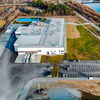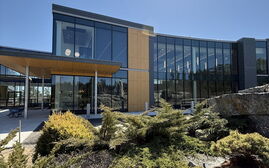
Processing Your Payment
Please do not leave this page until complete. This can take a few moments.
- News
-
Editions
View Digital Editions
Biweekly Issues
- December 15, 2025
- December 1, 2025
- Nov. 17, 2025
- November 03, 2025
- October 20, 2025
- October 6, 2025
- + More
Special Editions
- Lists
- Viewpoints
-
Our Events
Event Info
Award Honorees
- Calendar
- Biz Marketplace
Keynote speakers and pitch competition scheduled for next Maine Space Conference
 COURTESY / SOUBANH PHANTHAY, MAINE SPACE GRANT CONSORTIUM
Terry Shehata, executive director of the Maine Space Grant Consortium, addressed the audience at the inaugural Maine Space Conference in November 2023 in Portland.
COURTESY / SOUBANH PHANTHAY, MAINE SPACE GRANT CONSORTIUM
Terry Shehata, executive director of the Maine Space Grant Consortium, addressed the audience at the inaugural Maine Space Conference in November 2023 in Portland.
Keynote speakers and a slate of 20 sessions at the next Maine Space Conference will cover a variety of topics, from the legal problems arising out of human activities in outer space to investment and finance, sustainability and infrastructure, education and workforce development, research and data, national security and — last but not least — Maine’s emergent aerospace industry.
Maine’s second space conference is attracting global players and showcasing the state’s emerging space sector.
The Maine Space Grant Consortium and the board of directors of the Maine Space Corp. have opened registration and named keynote speakers for the event, which is scheduled for Oct. 23-25 at the Holiday Inn by the Bay in Portland.
“We are energized by the growing national interest in space activity taking place here in Maine,” said Terry Shehata, executive director of the Maine Space Grant Consortium. “This year, we’re attracting some of the nation’s top leaders in aerospace to join us, guide us, and explore together Maine’s future in the New Space economy.”
Shehata continued, “Maine could have an enormously lucrative and beneficial role to play in the future of space, if we mobilize to meet the moment.”
The goal of the 2024 conference is to expand on relationships with industry partners, government and investors.
Keynote speakers
Michelle Hanlon is executive director of the Center for Air and Space Law at the University of Mississippi School of Law, editor-in-chief of the Journal of Space Law, the world’s oldest law journal dedicated to the legal problems arising out of human activities in outer space; and co-founder of For All Moonkind Inc., a nonprofit dedicated to protecting human cultural heritage in space. Hanlon has written on topics related to orbital debris remediation, space solar power, small satellite constellations, environmental considerations and the protection of human heritage in space.

Gregory Richardson is executive director of the Consortium for Space Mobility and ISAM Capabilities, a nationwide coalition established under the direction of NASA and administered by the Aerospace Corp. Richardson is a senior project leader in the Human Exploration and Spaceflight Division at the Aerospace Corp., the only federally funded research and development center committed exclusively to the space enterprise. He has experience in space systems design, systems engineering and mission execution for innovative space systems.
Steven Platts is chief scientist at the Human Research Program at the NASA Johnson Space Center in Houston. He has led experiments for the space shuttle, the International Space Station, bed rest platforms and parabolic flights.
Christina Korp is an astronaut manager, space advisor, space marketer and president of Purpose Entertainment. Korp managed Apollo 11 astronaut Buzz Aldrin for 10 years and helped launch the Aldrin Family Foundation. She produced the last five galas at Kennedy Space Center celebrating Apollo 11 and currently works with Apollo 16 moonwalker Charlie Duke and NASA astronaut Nicole Stott.
This year’s conference is being positioned as an invitation for the global space community to engage with Maine's emerging space economy.
The conference will showcase space-related activities already underway at Loring Commerce Centre, Brunswick Landing, and within higher education and K-12 institutions in Maine.
Registration is open through Oct. 9, but early bird pricing ends Aug. 1.
For more information, click here.
Critical crossroads
Over 85 aerospace companies operate in Maine.
Maine also has a world-class advanced materials facilities and a polar orbit geographical advantage, making the state ideally positioned to become a New Space hub for the U.S., particularly as it relates to small satellites, according to a news release.
To succeed, Maine must recruit more space-related businesses; build upon the research and development and educational capabilities in institutions of higher education; and build a pipeline of students and workers, said Shehata.
“Maine remains at a critical crossroads,” he said. “Our pathway to space leads through our schools and universities, our entrepreneurs and business leaders, and through the funders and believers who can envision Maine as a New Space leader.”
The Maine Space Complex consists of three core business units that span across several geographic locations around the state of Maine.
In order of priority, the three units include:
- A space data and advanced analytics center, which can be located anywhere in Maine due to its virtual nature;
- A New Space innovation hub, proposed to be located at Brunswick Landing with a spoke at Loring Commerce Centre;
- Launch sites and services, which consists of staging areas and vertical and horizontal launch sites for sending small satellites into polar orbit from Brunswick Landing, Loring Commerce Centre and Washington County.
Pitch competition
The Maine Space Grant Consortium, the Maine Space Corp. and the Maine Center for Entrepreneurs said there will be a pitch competition at the conference.
The purpose of the competition is to support the development of talent and innovation in Maine’s space economy. The goal is to find innovations, ideas, space startups or small companies to grow that align with the new space value chain embodied in the Maine Space Complex. Innovations could lead to products and services that help solve problems in Maine and elsewhere and improve lives.
Eligible applicants are undergraduate and graduate students, faculty and researchers from institutions of higher education and nonprofit institutions, businesses, startups and budding entrepreneurs.
Applicants are restricted to the New England states. They must demonstrate how their innovations will support Maine’s space economy. Applicants do not have to own a business or be involved in the space industry.
The deadline for submitting a video application is close of business on Aug. 9.
Six finalists will be notified by Aug. 16 and will be invited to make their pitch to a panel of judges at the Maine Space Conference on Oct. 24.
Three winners will be announced at a networking event on Oct. 24 at Halo by the Point.
Three level of awards will be made at the end of the competition.
- $10,000 will be awarded to the top finalist
- $5,000 will be awarded to the first runner-up, sponsored by the Maine Technology Institute
- $2,500 will be awarded to the second runner-up.
For more information on the competition and application process, click here.
About The Maine Space Grant Consortium
The Maine Space Grant Consortium is an affiliate-based 501(c)(3) corporation and a member of the national network of consortia in all 50 states plus Puerto Rico and the District of Columbia. The network is funded by NASA’s National Space Grant College and Fellowship Program. Space Grant was established by Congress in 1988 to contribute to the nation’s science and engineering enterprise.
About the Maine Space Corp.
The Maine Space Corp. was created by the Maine Legislature as a quasi-independent state entity to establish the Maine Space Complex by leveraging the state's geographic, rocketry, manufacturing and higher education assets and capabilities to establish Maine as a national and international industry destination and an authority in launching small launch vehicles and small satellites into polar orbit. The corporation is governed by a 17-member board of directors. Six members are ex officio representing the Maine Department of Economic and Community Development, the University of Maine System, the Maine Community College System, the Maine Technology Institute, Midcoast Regional Redevelopment Authority, and the Loring Development Authority. The other 11 members are nominated by the governor and confirmed by the Maine Senate.
Mainebiz web partners
Related Content

The Giving Guide
The Giving Guide helps nonprofits have the opportunity to showcase and differentiate their organizations so that businesses better understand how they can contribute to a nonprofit’s mission and work.
Learn More
Work for ME
Work for ME is a workforce development tool to help Maine’s employers target Maine’s emerging workforce. Work for ME highlights each industry, its impact on Maine’s economy, the jobs available to entry-level workers, the training and education needed to get a career started.
Learn More
Groundbreaking Maine
Whether you’re a developer, financer, architect, or industry enthusiast, Groundbreaking Maine is crafted to be your go-to source for valuable insights in Maine’s real estate and construction community.
Learn more-
The Giving Guide
The Giving Guide helps nonprofits have the opportunity to showcase and differentiate their organizations so that businesses better understand how they can contribute to a nonprofit’s mission and work.
-
Work for ME
Work for ME is a workforce development tool to help Maine’s employers target Maine’s emerging workforce. Work for ME highlights each industry, its impact on Maine’s economy, the jobs available to entry-level workers, the training and education needed to get a career started.
-
Groundbreaking Maine
Whether you’re a developer, financer, architect, or industry enthusiast, Groundbreaking Maine is crafted to be your go-to source for valuable insights in Maine’s real estate and construction community.
ABOUT
NEW ENGLAND BUSINESS MEDIA SITES
No articles left
Get access now
In order to use this feature, we need some information from you. You can also login or register for a free account.
By clicking submit you are agreeing to our cookie usage and Privacy Policy
Already have an account? Login
Already have an account? Login
Want to create an account? Register
Get access now
In order to use this feature, we need some information from you. You can also login or register for a free account.
By clicking submit you are agreeing to our cookie usage and Privacy Policy
Already have an account? Login
Already have an account? Login
Want to create an account? Register











0 Comments